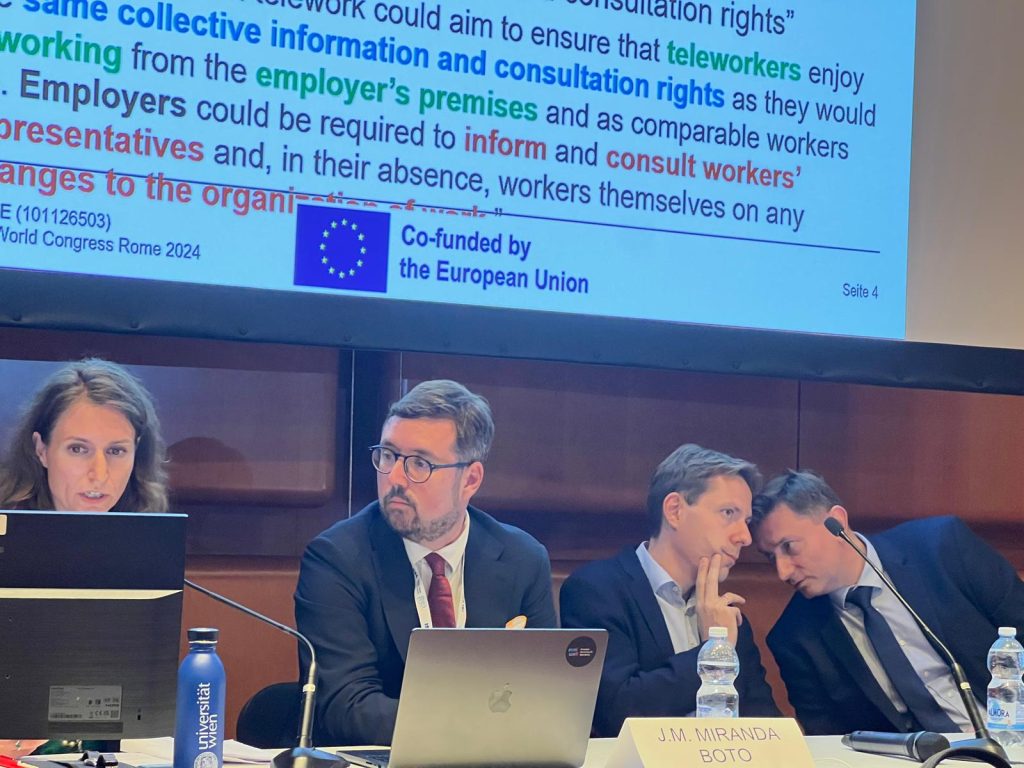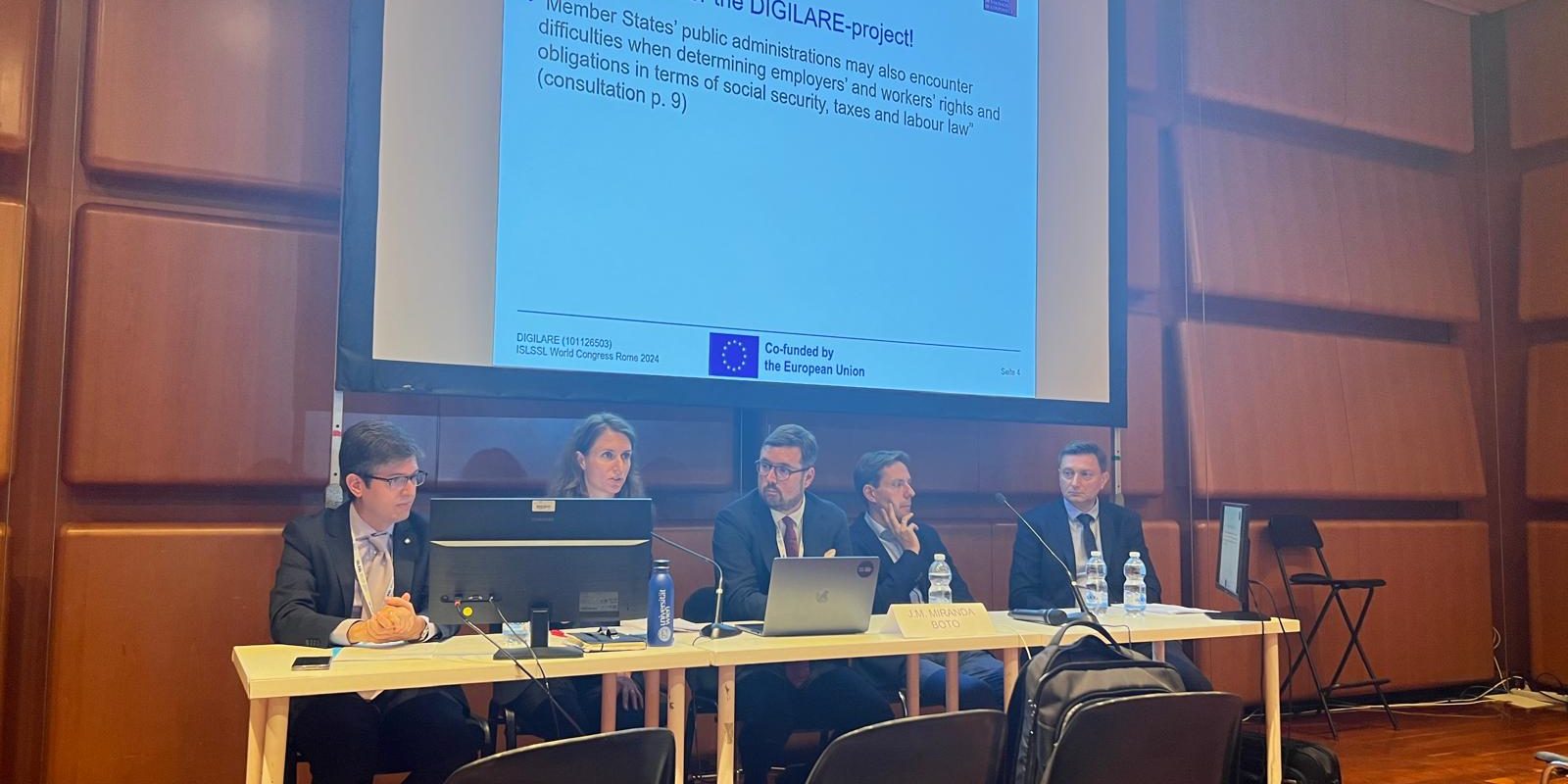XXIV World Congress of the International Society of Labour al Social Security Law

Project members were present at the XXIV World Congress of the International Society of Labour and Social Security Law. A panel, with the title Information and Consultation in the Digital Era was organised in the framework of Topic 3. The new trends in the collective labour law; Subtopic: New forms of employment and collective labour rights.
The abstracts of the presentations can be read here.
- Where is my works council? Cross-border telework and the fundamental right to information and consultation – Elisabeth Brameshuber
Cross-border teleworkers’ work is in itself transnational, in the most simple set of cases ‘just’ because of the fact that they sit in MS A and provide services for a company established in MS B. Do they ‘belong’ to the company in that sense that they have active/passive voting rights as regards employee representative bodies in MS B? What about a multitude of employees working from different MS, and only connecting virtually? What about those cases where the employer is a digital platform, with its seat in a Member State with a low minimum wage standard, while the whole organisation is carried out by managerial personnel situated in MS A (a high-wage country), and the work is carried out by several hundred workers sitting in MS A, B, C? What if the works organisation in MS A fulfils the criteria of the national definition of a ‘company’ in terms of employee representation, and if, as a result, according to national law at least those employees situated in MS A could participate in works council elections and therefore benefit of all statutory information, consultation and further participation, even co-determination rights? Could it be that the fundamental right to information and consultation (Article 27 EU CFR) does not apply ‘just’ because of the fact that the work is carried out digitally? It is true that telework offers many opportunities, but it should not deprive workers from their fundamental rights or make it impossible to make use of them.
From an EU law and from an international private law perspective, one of the few things that seems to be clear is that Article 8 Rome-I-Regulation (EC) 2008/539 does not apply to matters on information and consultation of workers, i.e. on collective representation itself. In fact, taking into account that also Directive 2002/14/EC refers to the Member States’ laws on that matter, in every single case, each Member State’s rules on international private law need to be investigated in order to determine whether a specific Member State’s jurisdiction applies. This might lead to double protection, i.e. a doubling of information or consultation rights, but also to a legislative lacuna.
This contribution aims at casting light at the afore-mentioned questions.
- Personal Scope of the Right to Information on Company Matters. Who is a Member of the Workplace Community? – Łukasz Pisarczyk
The workers’ right to information has various dimensions. It can be exercised either individually (data provided to workers) or collectively (by workers’ representatives). Collective information may constitute a part of collective bargaining procedure as well as an element of workers’ involvement in company (business) matters (e.g. Directive 2002/14). Information rights increase the level of predictability, mutual trust and worker protection (by providing ways to influence the employer’s decisions), in particular in the face of organizational and technological changes. From the axiological point of view, the right to information reflects the fact that workers are members of the workplace community. They contribute to its functioning and to achieving the employer’s goals. Ignoring the workers’ voice while deciding about company matters could lead to instrumental treatment of workers and may result in abuse of their dignity as working people. However, information rights gain a new dimension with the technological revolution and increasing share of atypical (non-employee) employment in the labour market. This raises the question of who should be eligible for the information rights, and what should be the scope of the information.
The contribution highlights the variety of national solutions in terms of workers’ representation and the scope of information, with particular focus on the differences between various regions and clusters of states. Next, it confronts domestic regulations with international and European standards in the light of reasons justifying the recognition of information rights. The author makes an attempt to answer the following question: what groups of non-employees should enjoy information rights by electing works councils (being elected to works councils) and/or by enjoying guarantees to receive data important for their situation? The changing character of the workplace, influenced by technological and organizational developments, must be taken into account. An additional issue is the potential conflict between the right to information and economic freedoms (in particular in the case of workers who enjoy the legal status of entrepreneurs). The analysis will, on an auxiliary basis, refer to findings concerning the right of non-employees (in particular the solo self-employed) to collective bargaining. However, since sources of the relevant rights are different, a simple transfer of reasoning which refers to collective bargaining would not be justified. The right to information on company matters should be provided with an autonomous justification corresponding to international and European standards as well as to its nature and functions. Potential criteria for being eligible for the information right are (a research hypothesis): (1) working vis-à-vis employees and (2) economic dependence. Working vis-à-vis employees supports the argument of direct inclusion of workers into the workplace community. The economic dependence reflects the special nature of a legal relationship based on long-lasting service providing work, and the domination of the employing party. These criteria may be applied to working in traditional units as well as in virtual communities (e.g. platform workers).
- Information and consultation rights in EU occupational safety and health law in transnational digital workplaces – Gábor Kártyás
One of the longest standing information and consultation (hereinafter: I/C) rights of workers’ representatives in EU law are prescribed in the occupational safety and health framework directive (Directive 89/391/EEC Art. 10-11, hereinafter: OSHFD). These provisions have been in force over 30 years without any major amendments and the later adopted individual OSH directives added little to this normative content. Empirical evidence shows that the workers’ involvement in the employer’s OSH processes has a positive impact on preventing injuries and other health risks [SWD(2017) 10 final, 43.].
Yet, these provisions need to be adapted to the changing nature of workplaces, especially as regards digital and transnational work environments. The aim of the presentation is to explore these challenges and to highlight how I/C rights can enhance OSH in such workplaces, focusing on the content, territorial and material scope of such rights.
As for the content of the relevant I/C rights, the presentation will argue that it is essential to apply the rules of the I/C framework directive (2002/21/EC) also in OSH matters. Although the later directive does not explicitly address its relation to the OSHFD, as it was adopted later than the OSHFD as a general legislation on I/C rights it shall also cover workers’ participation rights in OSH matters. Besides, the more detailed rules of the I/C framework directive are necessary to enhance the proper implementation of the OSHFD’s more general provisions.
The presentation will focus on workplaces where the employer is seated in one state while its employees perform from different states and connect to each other and to their employer mainly (or exclusively) via digital tools. EU law seems not to address the scope of application of the OSHFD or the I/C framework directive for such settings, although more and more activities can be organised this way (e.g. consumer services, legal consulting, accounting, journalism). The presentation will explain how national law should approach these situations to ensure the effective implementation of I/C rights.
Digitalisation also comes with new OSH risks, such as work intensification, working time fragmentation, isolation, burn-out or constant availability. I/C rights could play an important role in identifying such new risks and to explore the possible ways to reduce or eliminate them. OSH is connected to the biological features of human beings as such; consequently, OSH risk-management has an objective, international character. This underlines that OSH matters shall be approached on international level if the employer operates in transnational settings.
The presentation aims to highlight the merits of I/C rights in OSH law and explore the possible ways to adapt it to “boundaryless” workplaces where a closely cooperating international staff has less and less physical links among them.
- New Collective Rights for the AI Era – Daniel Pérez del Prado
Some research studies have highlighted that digitization affects managerial power in two main ways. On the one hand, the possibility of transferring the production partially or totally to another country or region empowers managerial position as it can be used as a threaten in all negotiations. This is not a new phenomenon, but it becomes even more frequent as technology advances, especially in the internal market. On the other hand, the growing and immeasurable capacity to obtain data and the greater advantages for its treatment facilitate decision-making and strengthen two fundamental facets of the management power, the faculties of organization and control.
Within this context, new regulations have emerged, significantly the Directive 2019/1152 on Transparent and Predictable Working Conditions. Others are coming, such as the Proposal for a Directive on improving working conditions in platform work or the AI Act. All of them have a point in common, as regulatory intervention is fundamentally focusing, although not exclusively, on promoting greater symmetry in the access and use of information (this is what “transparency” practically means) and establishing limits to a greater power of direction.
The purpose of this paper is to analyze, from an interdisciplinary perspective, both legal and economic, these two areas of action, origin and consequence of the current transformation of the managerial power of the employer. Concerning the access and treatment of information within the company, we have been observed that, despite the significant progress that the introduction of workers representatives’ information rights, there is still a long way to go, especially with regard to individual information rights, i.e. those of the worker himself. Regarding limits, it is necessary to pay attention to, not only those expressly mentioned in this new European regulatory framework, but particularly those that are being set by collective bargaining.

